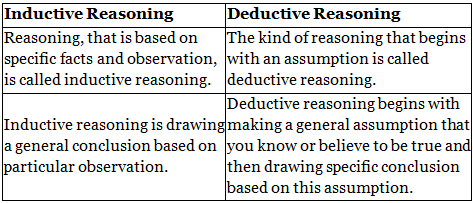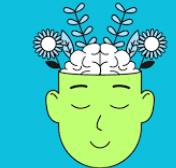Important Questions & Answers:Thinking | Psychology Class 11 - Humanities/Arts PDF Download
Q.1. Bring out two points of difference between Inductive reasoning and Deductive reasoning.
Q.2. _________ is the base of all cognitive activities.
Thinking
Q.3. What is thinking?
Thinking is a complex mental process that involves manipulating and analyzing information. It is directed towards solving problems, making judgments, and deciding between options. This internal process can be inferred from observable behaviors, such as a chess player contemplating their next move. Thinking is organized and goal-directed, often relying on past experiences or strategies for new tasks. Ultimately, it plays a crucial role in human cognition and the development of knowledge.
Q4: What are mental images?
Mental images are pictures or scenes we create in our mind. They help us remember things we have seen or experienced. For example, when you think of your home, you can see it in your mind, even if you are not there.
Q5: What is a memory image?
A memory image is a picture in our mind that looks like the real object or event. It helps us recall things we have seen before, like remembering your favorite toy by picturing it in your head.
Q6 : How do natural concepts differ from logical concepts?
Natural concepts are formed through experiences and observations, while logical concepts are defined by specific rules and criteria.
- Examples: Natural concepts include categories like "bird" based on real-world examples; logical concepts include mathematical definitions like "triangle" based on properties.
- Flexibility: Natural concepts are more flexible and can vary based on context; logical concepts are rigid and universally applicable.
- Formation: Natural concepts develop through personal experiences; logical concepts are often taught through formal education.
- Usage: Natural concepts aid in everyday categorization; logical concepts are used in structured reasoning and problem-solving.
Natural concepts don’t have strict rules and are based on examples or prototypes, like how we think of fruit. Logical concepts, on the other hand, have clear rules that define them, like how a square must have four equal sides.
Q7: Discuss the various types of thinking processes mentioned and their significance in everyday life. Provide examples to illustrate your points.
The concept of thinking encompasses various types of cognitive processes, each serving a unique purpose in our daily lives. Understanding these processes is essential as they influence how we interact with the world. Below are some key types of thinking processes:
- Abstract Thinking: This type of thinking allows individuals to understand concepts that are not directly observable. For example, abstract thinking enables a person to grasp the concept of justice or freedom. This ability is significant in fields like philosophy and law, where understanding complex ideas is vital.
- Reasoning: Reasoning involves drawing conclusions based on premises or evidence. It plays a critical role in daily decision-making. For instance, when deciding whether to purchase a product, a person may weigh the pros and cons, analyzing the evidence to reach a logical conclusion. This process is essential for making informed choices.
- Problem-Solving: Problem-solving is a fundamental aspect of thinking that helps individuals tackle challenges. For example, when faced with a math problem, a student must analyze the information, apply relevant concepts, and work through the steps to find a solution. This skill is crucial in both academic and real-world contexts.
- Judging: Judging involves evaluating information or situations to form opinions or make decisions. For instance, in a group discussion, individuals may judge the validity of different arguments presented. This type of thinking is significant in fostering critical thinking skills and encouraging informed debate.
- Decision-Making: Decision-making is the culmination of various thinking processes where individuals choose a course of action. This could be as simple as deciding what to have for lunch or as complex as making career choices. Effective decision-making is crucial for personal success and satisfaction in life.
Q8: Explain the importance of forming concepts in our daily lives. How do concepts help us organize knowledge and improve our thinking processes?
- Organization of Knowledge: Concepts play a crucial role in organizing our knowledge. When we encounter new information or experiences, we categorize them into existing concepts. This organization allows us to retrieve information quickly when needed. For example, when we think of "dog," we immediately recall various types of dogs, their characteristics, and behaviors. This mental framework makes it easier to remember and use information effectively.
- Time and Effort Efficiency: By forming concepts, we save time and effort in processing information. Instead of analyzing each new piece of information from scratch, we can place it into a relevant category. This categorization helps us make decisions faster. For instance, when shopping for fruit, if we categorize apples, oranges, and bananas under "fruits," we can quickly choose which one to buy without needing to consider each option individually.
- Streamlined Thought Processes: Concepts help streamline our thinking processes by providing a mental shortcut. When we understand a concept, we can apply it to various situations without needing to rethink everything. For example, understanding the concept of "gravity" allows us to predict how objects will behave in different conditions, aiding in problem-solving in physics or engineering.
- Enhanced Communication: Concepts also enhance our ability to communicate effectively. When we share ideas, using well-defined concepts ensures that others understand our thoughts. For instance, using the concept of "justice" in a conversation allows us to discuss related issues like fairness and law without needing to explain every detail. This shared understanding fosters better dialogue and collaboration.
- Facilitation of Learning: Lastly, forming concepts facilitates learning. It provides a foundation upon which new information can be built. As we learn new things, we can integrate them into our existing concepts. For example, learning about different animal species can expand our concept of "animal," allowing us to appreciate biodiversity. This interconnected knowledge structure encourages continuous learning and intellectual growth.
Q9: Compare and contrast natural concepts and logical concepts. How do these types of concepts influence our understanding of the world?
- Definition of Natural Concepts: Natural concepts are those that do not have a strict definition or set of features. They are often based on prototypes, which are the best examples of a category. For instance, when we think of a bird, we might picture a robin or a sparrow as a prototype, even though there are various species of birds that may not fit this image perfectly. This flexibility allows us to categorize objects based on similarities and differences.
- Definition of Logical Concepts: In contrast, logical concepts are clearly defined by specific rules or features. These concepts require strict criteria for categorization. For example, a triangle is defined as a shape with three sides. Any shape that does not meet this criterion cannot be classified as a triangle. Logical concepts provide clarity and precision, which can be particularly useful in areas like mathematics and science.
- Influence on Understanding: The distinction between natural and logical concepts influences our understanding of the world. Natural concepts allow for a broader and more flexible approach to categorization, which can be beneficial when dealing with complex or ambiguous situations. Logical concepts, however, promote accuracy and consistency, which are essential in scientific and analytical contexts.
- Application in Real Life: The application of these concepts varies in everyday life. For example, when we encounter something unfamiliar, we might first use natural concepts to categorize it based on observable features. If we later need to analyze its properties scientifically, we would apply logical concepts. This ability to switch between concepts enhances our adaptability in different situations.
- Learning and Development: Understanding the difference between natural and logical concepts contributes to cognitive development. Children often start with natural concepts as they explore their surroundings and gradually learn logical concepts as they acquire more knowledge. This progression is crucial for developing critical thinking skills and advancing in academic subjects.
Q10: Describe the role of analogy in reasoning and explain how it can enhance our understanding of complex concepts. Provide examples to illustrate your points.
Analogy plays a significant role in reasoning by allowing us to draw connections between two different things based on their similarities. This method can simplify complex concepts and make them easier to understand.
- Definition of Analogy: An analogy is a comparison made between two different things to highlight some form of similarity. This can help clarify ideas by relating them to something more familiar to the audience.
- Enhancing Understanding: By using analogy, we can relate new or complex information to existing knowledge. For example, explaining the structure of an atom by comparing it to a solar system, where electrons are like planets orbiting the sun (the nucleus), helps people visualize the concept better.
- Making Complex Ideas Accessible: Analogies can break down complex ideas into simpler terms. For instance, comparing the flow of electricity in a circuit to water flowing through pipes can help individuals grasp electrical concepts without needing extensive technical knowledge.
- Encouraging Critical Thinking: Using analogies in reasoning encourages critical thinking by prompting individuals to consider the similarities and differences between the two concepts being compared. This deeper analysis can lead to better understanding and retention of information.
- Limitations of Analogies: While analogies are powerful tools in reasoning, they can also be misleading if the similarities between the two concepts are not substantial. It is important to recognize the limits of an analogy and not overextend the comparison.

|
43 videos|119 docs|18 tests
|
FAQs on Important Questions & Answers:Thinking - Psychology Class 11 - Humanities/Arts
| 1. What is the importance of critical thinking in exams? |  |
| 2. How can critical thinking skills be developed for exams? |  |
| 3. Can critical thinking help improve exam performance? |  |
| 4. What are some common obstacles to critical thinking during exams? |  |
| 5. How can critical thinking be applied to different types of exam questions? |  |


















